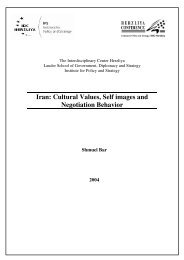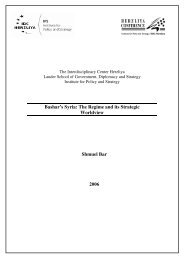The Zawahiri Letter and the Strategy of al-Qaeda
The Zawahiri Letter and the Strategy of al-Qaeda
The Zawahiri Letter and the Strategy of al-Qaeda
Create successful ePaper yourself
Turn your PDF publications into a flip-book with our unique Google optimized e-Paper software.
United States <strong>and</strong> Israel; (6) a tot<strong>al</strong> confrontation between Islam <strong>and</strong> <strong>the</strong> West in2016-2020; <strong>and</strong> (7) a “Decisive Victory” for Islam in 2020.<strong>The</strong> centr<strong>al</strong>ity <strong>of</strong> <strong>the</strong> Iraqi jihad has <strong>al</strong>so affected <strong>al</strong>-<strong>Qaeda</strong>’s strategic thinkingregarding terrorism outside Iraq. While <strong>the</strong> <strong>Zawahiri</strong> letter does not refer to jihad<strong>the</strong>aters outside <strong>of</strong> Iraq, o<strong>the</strong>r documents have pointed out how jihadi missions in <strong>the</strong>West should support <strong>the</strong> go<strong>al</strong> <strong>of</strong> weakening <strong>the</strong> co<strong>al</strong>ition in Iraq <strong>and</strong> speeding up <strong>the</strong>American defeat. This thinking differs significantly from <strong>the</strong> classic ration<strong>al</strong>e for suchattacks, which is simply to “strike fear in <strong>the</strong> hearts <strong>of</strong> <strong>the</strong> enemies <strong>of</strong> Allah.”<strong>The</strong> perception <strong>of</strong> <strong>the</strong> feasibility <strong>of</strong> victory in Iraq has led to a “proactive” jihad toestablish a C<strong>al</strong>iphate replacing <strong>the</strong> “defensive jihad” to protect Muslim l<strong>and</strong>s—<strong>the</strong>core principle <strong>of</strong> Abdullah Azzam, <strong>the</strong> leader <strong>of</strong> <strong>the</strong> Afghan mujahidin. Though <strong>the</strong>establishment <strong>of</strong> a C<strong>al</strong>iphate was an element <strong>of</strong> <strong>al</strong>-<strong>Qaeda</strong>’s ideology in <strong>the</strong> past, itremained in <strong>the</strong> background because it seemed to <strong>the</strong>m less achievable than it doestoday. <strong>The</strong> C<strong>al</strong>iphate’s new prominence has far-reaching ramifications for intra-Muslim relations: while a Muslim regime may conceivably tolerate different Islamicsects, a C<strong>al</strong>iph is obliged to define <strong>the</strong> one true form <strong>of</strong> Islam that can be followedwithin <strong>the</strong> re<strong>al</strong>m. <strong>The</strong> adoption <strong>of</strong> <strong>the</strong> C<strong>al</strong>iphate as a go<strong>al</strong> for <strong>al</strong>-<strong>Qaeda</strong>, <strong>the</strong>refore,imposes on <strong>the</strong> organization a fat<strong>al</strong> confrontation with o<strong>the</strong>r, heterodox Islamicschools.<strong>Zawahiri</strong>’s criticism <strong>of</strong> <strong>the</strong> indiscriminate attacks on <strong>the</strong> Shia is not unique in <strong>al</strong>-<strong>Qaeda</strong> circles. More than a few s<strong>al</strong>afi ulama have stated that <strong>the</strong> massacre <strong>of</strong> Muslims,including Shiite Muslims, is counterproductive to <strong>al</strong>-<strong>Qaeda</strong>’s strategy <strong>of</strong> gaining massMuslim support for its struggle. <strong>The</strong> older generation <strong>of</strong> <strong>al</strong>-<strong>Qaeda</strong>-linked s<strong>al</strong>afi ulamais clearly growing uneasy. Included in this group are Abu Basir <strong>al</strong>-Tartusi, who took ast<strong>and</strong> against <strong>the</strong> London bombings on <strong>the</strong> basis <strong>of</strong> his interpretation <strong>of</strong> Islamic law onjihad; Abu Muhammad <strong>al</strong>-Maqdisi, who criticized Zarqawi, his erstwhile disciple, in apublic statement on <strong>the</strong> same basis; <strong>and</strong> Mohammed <strong>al</strong>-Masari, one <strong>of</strong> <strong>the</strong> fa<strong>the</strong>rs <strong>of</strong><strong>the</strong> Saudi reform movement in London. <strong>The</strong>se scholars hold undeniable s<strong>al</strong>afi-jihadicredenti<strong>al</strong>s <strong>and</strong> are close to <strong>Zawahiri</strong> ideologic<strong>al</strong>ly <strong>and</strong> organization<strong>al</strong>ly. It isconceivable, <strong>the</strong>refore, that <strong>the</strong>y influenced <strong>Zawahiri</strong>’s decision to add his weight to<strong>the</strong>ir arguments.<strong>Zawahiri</strong> approaches Zarqawi’s actions from a more practic<strong>al</strong> <strong>and</strong> politic<strong>al</strong> st<strong>and</strong>pointthan his colleagues, who rely <strong>al</strong>most exclusively on Islamic jurisprudence, but <strong>al</strong>l <strong>the</strong>irobjections are rooted in both religious conviction <strong>and</strong> <strong>the</strong>ir bitter experiences inAfghanistan. <strong>The</strong>y are aware that <strong>the</strong> T<strong>al</strong>iban, by <strong>the</strong>ir Pashto particularism, hadforfeited <strong>the</strong> support <strong>of</strong> <strong>the</strong> wider population, thus facilitating <strong>the</strong> American invasion<strong>and</strong> occupation. In <strong>the</strong>ir eyes, <strong>the</strong> likelihood <strong>of</strong> making a similar mistake in Iraq iscompounded by <strong>the</strong> large proportion <strong>of</strong> Shia in <strong>the</strong> population.<strong>The</strong> Au<strong>the</strong>nticity <strong>of</strong> <strong>the</strong> <strong>Letter</strong><strong>The</strong> above an<strong>al</strong>ysis assumes, <strong>of</strong> course, that <strong>the</strong> letter is au<strong>the</strong>ntic—an assumption thatmany reject. Some claim that <strong>the</strong> very fact that <strong>the</strong> letter supports American portray<strong>al</strong>s<strong>of</strong> <strong>the</strong> jihadists in Iraq is cause enough to doubt its au<strong>the</strong>nticity. Ano<strong>the</strong>r argument isthat a website gener<strong>al</strong>ly accepted as reflecting <strong>al</strong>-<strong>Qaeda</strong>’s positions categoric<strong>al</strong>lydenied <strong>the</strong> au<strong>the</strong>nticity <strong>of</strong> <strong>the</strong> letter, describing it as work <strong>of</strong> <strong>the</strong> “Black House”—i.e.,<strong>the</strong> Shia. O<strong>the</strong>r arguments are based on some positions taken in <strong>the</strong> document that7
















